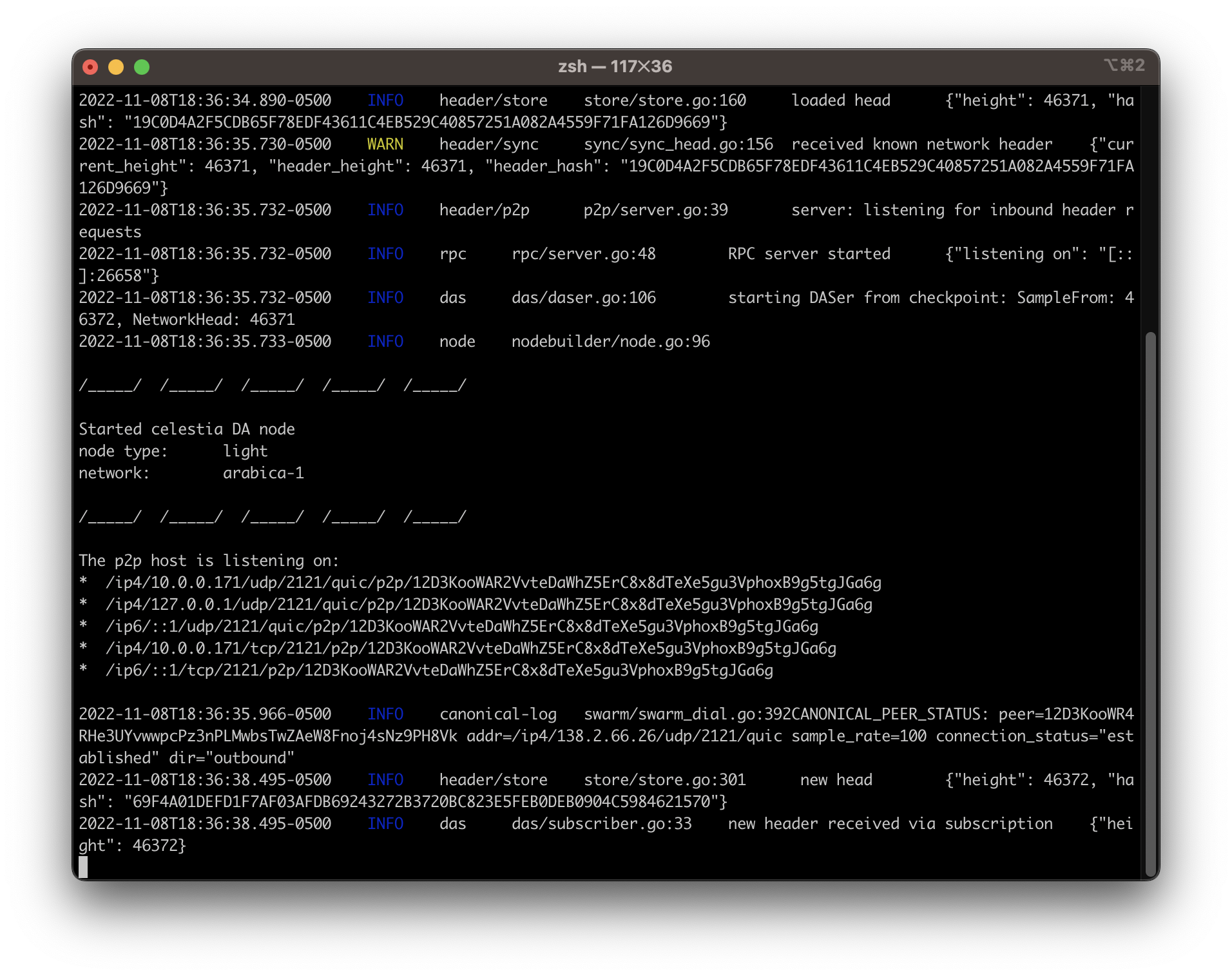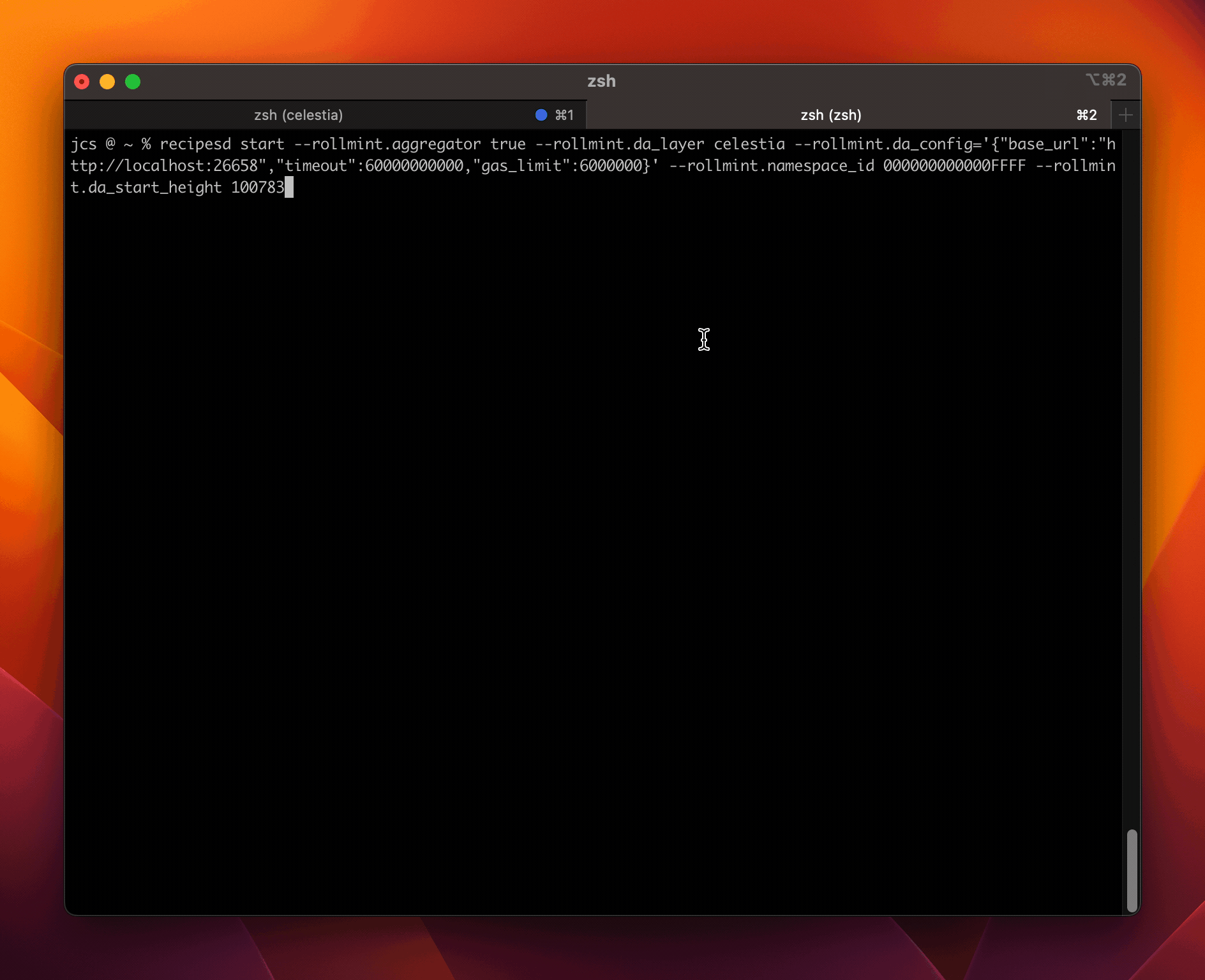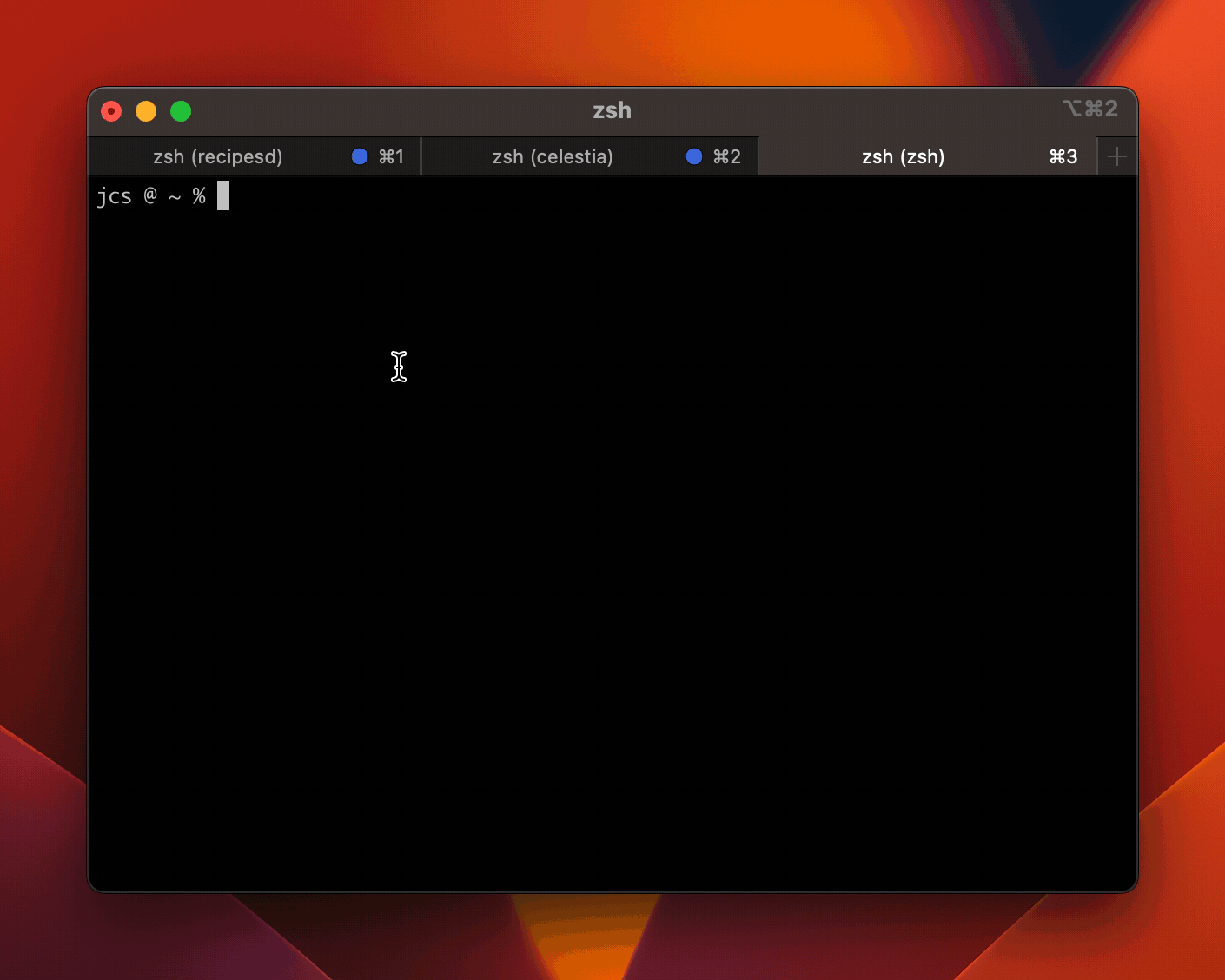🥗 Recipe Book rollup
📖 Overview
In this tutorial, we are going to build a blockchain for your favorite recipes. The goal of this tutorial is to create a Rollkit rollup with a module that allows you to write and read data to and from your application-specific blockchain. The end user will be able to submit new recipes and read them from the blockchain.
In the GM World tutorial, we defined a new API endpoint and modified a keeper query function to return static data. In this tutorial, we will be modifying the state with transactions (Cosmos SDK messages) that are routed to a module and its message handlers, which are sent to the recipes blockchain.
TIP
This tutorial will explore developing with Rollkit, which is still in Alpha stage. If you run into bugs, please write a Github Issue ticket or let us know in our Telegram.
WARNING
The script for this tutorial is built for Celestia's Arabica devnet.
📋 Table of contents for this tutorial
The following tutorial is broken down into the following sections:
Table of contents
💻 Prerequisites
🏗 Scaffolding your rollup
🔥 Use Ignite CLI to scaffold a recipes rollup
Run the following command to scaffold your recipes chain using Ignite CLI:
ignite scaffold chain recipes --address-prefix recipesYour new recipes chain has been scaffolded and --address-prefix recipes allows the address prefix to be recipes instead of cosmos.
Change into the recipes directory:
cd recipes💎 Installing Rollkit
To swap out Tendermint for Rollkit, run the following commands:
go mod edit -replace github.com/cosmos/cosmos-sdk=github.com/rollkit/cosmos-sdk@v0.46.13-rollkit-v0.9.0-no-fraud-proofs
go mod edit -replace github.com/tendermint/tendermint=github.com/rollkit/cometbft@v0.0.0-20230524013049-75272ebaee38
go mod tidy
go mod downloadgo mod edit -replace github.com/cosmos/cosmos-sdk=github.com/rollkit/cosmos-sdk@v0.46.13-rollkit-v0.9.0-no-fraud-proofs
go mod edit -replace github.com/tendermint/tendermint=github.com/rollkit/cometbft@v0.0.0-20230524013049-75272ebaee38
go mod tidy
go mod download💬 Message types
✨ Create message types
Create a message type and its handler with the message command:
ignite scaffold message createRecipe dish ingredientsResponse:
modify proto/recipes/recipes/tx.proto
modify x/recipes/client/cli/tx.go
create x/recipes/client/cli/tx_create_recipe.go
create x/recipes/keeper/msg_server_create_recipe.go
modify x/recipes/module_simulation.go
create x/recipes/simulation/create_recipe.go
modify x/recipes/types/codec.go
create x/recipes/types/message_create_recipe.go
create x/recipes/types/message_create_recipe_test.go
🎉 Created a message `createRecipe`.Head to your recipes/proto/recipes/recipes/tx.proto file and you will see the MsgCreateRecipe has been created. Add uint64 id = 1; to the MsgCreateRecipeResponse function:
message MsgCreateRecipeResponse {
uint64 id = 1;
}🤿 Diving deeper into the message code
Looking further into the message, we can see that MsgCreateRecipe has 3 fields: creator, dish, and ingredients.
message MsgCreateRecipe {
string creator = 1;
string dish = 2;
string ingredients = 3;
}We can also see that the CreateRecipe RPC has already been added to the Msg service:
service Msg {
rpc CreateRecipe(MsgCreateRecipe) returns (MsgCreateRecipeResponse);
}📕 Define messages logic
Navigate to recipes/x/recipes/keeper/msg_server_create_recipe.go. For our recipes chain, we want the dish and ingredients to be written to the blockchain’s state as a new recipe. Add the following code to the CreateRecipe function underneath the imports:
func (k msgServer) CreateRecipe(goCtx context.Context, msg *types.MsgCreateRecipe) (*types.MsgCreateRecipeResponse, error) {
// Get the context
ctx := sdk.UnwrapSDKContext(goCtx)
// Create variable of type Recipe
var recipe = types.Recipe{
Creator: msg.Creator,
Dish: msg.Dish,
Ingredients: msg.Ingredients,
}
// Add a recipe to the store and get back the ID
id := k.AppendRecipe(ctx, recipe)
// Return the ID of the recipe
return &types.MsgCreateRecipeResponse{Id: id}, nil
}You will see errors in your text editor, which we will resolve in the next step.
🔁 Keepers
📗 Define Recipe type and AppendRecipe keeper method
Create a file recipes/proto/recipes/recipes/recipe.proto and define the Recipe message:
syntax = "proto3";
package recipes.recipes;
option go_package = "recipes/x/recipes/types";
message Recipe {
string creator = 1;
uint64 id = 2;
string dish = 3;
string ingredients = 4;
}📘 Define keeper methods
Now you’ll define your AppendRecipe keeper method.
Create the recipes/x/recipes/keeper/recipe.go file. The AppendRecipe function is a placeholder to brainstorm how to implement it:
package keeper
import (
"encoding/binary"
"github.com/cosmos/cosmos-sdk/store/prefix"
sdk "github.com/cosmos/cosmos-sdk/types"
"recipes/x/recipes/types"
)
// func (k Keeper) AppendRecipe() uint64 {
// count := k.GetRecipeCount()
// store.Set()
// k.SetRecipeCount()
// return count
// }Add these prefixes to the recipes/x/recipes/types/keys.go file in the const and add a comment for your reference:
const (
//...
// Keep track of the index of recipes
RecipeKey = "Recipe-value-"
RecipeCountKey = "Recipe-count-"
)Next, implement GetRecipeCount in the recipes/x/recipes/keeper/recipe.go file:
func (k Keeper) GetRecipeCount(ctx sdk.Context) uint64 {
// Get the store using storeKey (which is "recipes") and RecipeCountKey (which is "Recipe-count-")
store := prefix.NewStore(ctx.KVStore(k.storeKey), []byte(types.RecipeCountKey))
// Convert the RecipeCountKey to bytes
byteKey := []byte(types.RecipeCountKey)
// Get the value of the count
bz := store.Get(byteKey)
// Return zero if the count value is not found (for example, it's the first recipe)
if bz == nil {
return 0
}
// Convert the count into a uint64
return binary.BigEndian.Uint64(bz)
}And then SetRecipeCount:
func (k Keeper) SetRecipeCount(ctx sdk.Context, count uint64) {
// Get the store using storeKey (which is "recipes") and RecipeCountKey (which is "Recipe-count-")
store := prefix.NewStore(ctx.KVStore(k.storeKey), []byte(types.RecipeCountKey))
// Convert the RecipeCountKey to bytes
byteKey := []byte(types.RecipeCountKey)
// Convert count from uint64 to string and get bytes
bz := make([]byte, 8)
binary.BigEndian.PutUint64(bz, count)
// Set the value of Recipe-count- to count
store.Set(byteKey, bz)
}Now you’re ready to implement the AppendRecipe function at the top of the file above GetRecipeCount and SetRecipeCount:
func (k Keeper) AppendRecipe (ctx sdk.Context, recipe types.Recipe) uint64 {
// Get the current number of recipes in the store
count := k.GetRecipeCount(ctx)
// Assign an ID to the recipe based on the number of recipes in the store
recipe.Id = count
// Get the store
store := prefix.NewStore(ctx.KVStore(k.storeKey), []byte(types.RecipeKey))
// Convert the recipe ID into bytes
byteKey := make([]byte, 8)
binary.BigEndian.PutUint64(byteKey, recipe.Id)
// Marshal the recipe into bytes
appendedValue := k.cdc.MustMarshal(&recipe)
// Insert the recipe bytes using recipe ID as a key
store.Set(byteKey, appendedValue)
// Update the recipe count
k.SetRecipeCount(ctx, count+1)
return count
}Now you have implemented all the code required to create new recipes and store them on-chain. When a transaction that contains a message type MsgCreateRecipe is broadcast, the message is routed to the recipes module.
k.CreateRecipecallsAppendRecipe, which gets the recipe count, adds a recipe using the count as the ID, increments the count, and returns the ID
🍽️ Querying recipes
🖥 Query recipes
In order to query your recipes, scaffold a query with Ignite:
ignite scaffold query dishes --response dish,ingredientsA response on a successful scaffold will look like this:
modify proto/recipes/recipes/query.proto
modify x/recipes/client/cli/query.go
create x/recipes/client/cli/query_dishes.go
create x/recipes/keeper/query_dishes.go
🎉 Created a query `dishes`.In the proto/recipes/recipes/query.proto file import:
import "recipes/recipes/recipe.proto";Add pagination to the recipe request:
message QueryDishesRequest {
// Adding pagination to request
cosmos.base.query.v1beta1.PageRequest pagination = 1;
}Add pagination to the recipe response:
message QueryDishesResponse {
// Returning a list of recipes
repeated Recipe Recipe = 1;
// Adding pagination to response
cosmos.base.query.v1beta1.PageResponse pagination = 2;
}In order to implement recipe querying logic in recipes/x/recipes/keeper/query_dishes.go, delete the file contents and replace them with:
package keeper
import (
"context"
"github.com/cosmos/cosmos-sdk/store/prefix"
sdk "github.com/cosmos/cosmos-sdk/types"
"github.com/cosmos/cosmos-sdk/types/query"
"google.golang.org/grpc/codes"
"google.golang.org/grpc/status"
"recipes/x/recipes/types"
)
func (k Keeper) Dishes(c context.Context, req *types.QueryDishesRequest) (*types.QueryDishesResponse, error) {
// Throw an error if request is nil
if req == nil {
return nil, status.Error(codes.InvalidArgument, "invalid request")
}
// Define a variable that will store a list of recipes
var dishes []*types.Recipe
// Get context with the information about the environment
ctx := sdk.UnwrapSDKContext(c)
// Get the key-value module store using the store key (in our case store key is "chain")
store := ctx.KVStore(k.storeKey)
// Get the part of the store that keeps recipes (using recipe key, which is "Recipe-value-")
recipeStore := prefix.NewStore(store, []byte(types.RecipeKey))
// Paginate the recipes store based on PageRequest
pageRes, err := query.Paginate(recipeStore, req.Pagination, func(key []byte, value []byte) error {
var dish types.Recipe
if err := k.cdc.Unmarshal(value, &dish); err != nil {
return err
}
dishes = append(dishes, &dish)
return nil
})
// Throw an error if pagination failed
if err != nil {
return nil, status.Error(codes.Internal, err.Error())
}
// Return a struct containing a list of recipes and pagination info
return &types.QueryDishesResponse{Recipe: dishes, Pagination: pageRes}, nil
}👩🍳 Running the recipes rollup
✨ Run a Celestia light node
Follow instructions to install and start your Celestia Data Availalbility layer Light Node selecting the network that you previously used. You can find instructions to install and run the node here.
After you have Go and Ignite CLI installed, and your Celestia Light Node running on your machine, you're ready to build, test, and launch your own sovereign rollup.
Be sure you have initialized your node before trying to start it. When starting your node, remember to enable the gateway. Your start command should look similar to:
celestia light start --core.ip consensus-full-arabica-9.celestia-arabica.com --p2p.network arabica
🗞️ Start the recipes rollup
We have a handy init.sh found in this repo here.
We can copy it over to our directory with the following commands:
# From inside the `recipes` directory
wget https://raw.githubusercontent.com/rollkit/docs/main/docs/scripts/recipes/init.shThis copies over our init.sh script to initialize our Recipes Rollup.
You can view the contents of the script to see how we initialize the Recipes Rollup.
🟢 From your project working directory (recipes/), start the chain with:
bash init.shWith that, we have kickstarted our recipesd network!

Open another teminal instance. Now, create your first recipe in the command line by sending a transaction from recipes-key, when prompted, confirm the transaction by entering y:
recipesd tx recipes create-recipe salad "spinach, mandarin oranges, sliced almonds, smoked gouda, citrus vinagrette" --from recipes-key --keyring-backend test
⌨️ Query your recipes with the CLI
To query all of the on-chain recipes:
recipesd q recipes dishes
🎉 Congratulations, again! You have now successfully built a recipe book rollup.